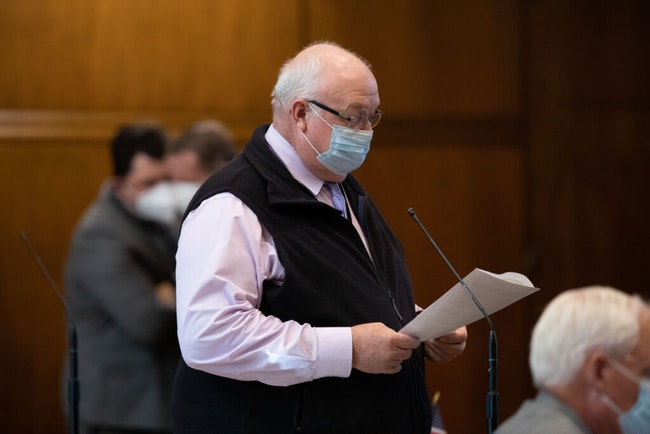
State Sen. Lynn Findley, R-Vale. (Amanda Loman/Oregon Capital Chronicle)
VALE – Significant victories proved elusive for the region’s two state lawmakers during the 2022 Oregon Legislature.
State Rep. Mark Owens, R-Crane, and state Sen. Lynn Findley, R-Vale, said while there were some minor wins, most Republican-inspired legislative action foundered against the Democratic majority.
“Very little positive came out of the session,” said Owens.
Republicans hold 23 seats in the 60-person House and 11 in an Oregon Senate with 30 lawmakers.
Owens and Findley, though, did point to some successes, including their effort to steer state money to several county institutions.
Findley and Owens helped direct $2 million to the Malheur County Fair, part of a $1.4 billion supplemental budget approved by legislators. Findley also said he was able earmark $2.5 million for Treasure Valley Community College to help kick start an apprentice program devoted to renewable energy.
The two lawmakers also collaborated to funnel $6 million to the Eastern Oregon Border Economic Development Board. Created in 2017, the border board offers an array of grant and loan programs to help spur economic development in Malheur County along the Idaho border.
 State Rep. Mark Owens, R-Crane, said he was disappointed a bill to provide overtime compensation for farm workers was passed before it could be modified. (The Enterprise/PAT CALDWELL).
State Rep. Mark Owens, R-Crane, said he was disappointed a bill to provide overtime compensation for farm workers was passed before it could be modified. (The Enterprise/PAT CALDWELL).
The successes, however, were overshadowed by a number of legislative defeats, said Findley.
Despite strong opposition from Oregon’s farming industry, legislators pushed through Senate Bill 4002, requiring for the first time that overtime be paid to agriculture workers after 40 hours. The new law will be phased in over a five-year period and establishes personal and corporate income tax credits to offset new overtime costs.
Seven states have adopted similar legislation.
Overtime pay for most people was certified in the Fair Labor Standards Act of 1938 but farm workers were exempted.
The new legislation was controversial and attracted a sizeable amount of testimony from opponents and supporters.
Supporters of the legislation believe it will level an unfair playing field in terms of pay and eradicate a mandate with racist overtones. Proponents believe farmworkers deserve equal treatment as any other worker.
Not surprisingly most of the opposition to the legislation came from the agriculture industry. Opponents believe it will create unwanted, additional costs for farmers and speed up mechanization which would lead to fewer workers during planting and harvest.
“It’s a terrible piece of legislation” said Findley.
He said the bill will “change the way farmers farm.”
“Farmers have razor thin margins as it is. It needed to be fully vetted and we did not do that and I think it’s terrible,” said Findley.
Owens said he wants farmworkers to “make the wage they deserve” but that “mandatory overtime is not the way to get there.”
A better way, he said, would be to provide short-term exemptions from overtime during planting and harvest seasons. That’s traditionally when farm workers put in the longest work weeks.
“There was some opportunity to get there,” he said.
Findley said the overtime bill was “frustrating” because Democrats “wouldn’t listen to ways to make it better.”
Findley said exceptions to “recognize peak periods” from 10 to 12 weeks a year – during harvest or planting – would make the new law reasonable.
“We amended a lot of other bills to make them palatable,” he said.
Findley and Owens sponsored Senate Bill 1507 to exempt sales of prescription drugs, diapers, baby formula and feminine hygiene products from the state’s corporate activity tax. The bill died in committee.
Owens said Republican lawmakers still play a lot of defense in the legislature.
“We continue to try to minimize the negative effects of bad policy,” he said.
Findley said there was just “some bad stuff” approved in the 50 Senate bills that passed.
“Four of them were Republican bills. All the rest were Democratic bills. And most of them were detrimental,” said Findley.
News tip? Contact reporter Pat Caldwell at [email protected]
Previous coverage:
State Rep. Mark Owens eyes ag overtime bill as short session nears
Malheur County leaders say vaccine mandate could cripple, or close schools, ambulance service
State lawmakers criticize conservation plan, redistricting blueprint
EXCELLENCE IN JOURNALISM – Available for $5 a month. Subscribe to the digital service of the Enterprise and get the very best in local journalism. We report with care, attention to accuracy, and an unwavering devotion to fairness. Get the kind of news you’ve been looking for – day in and day out from the Enterprise.




